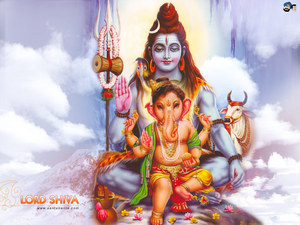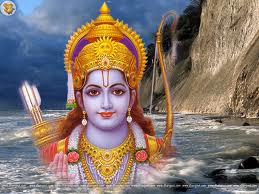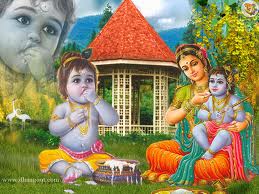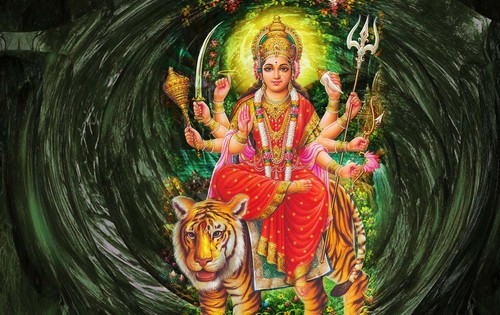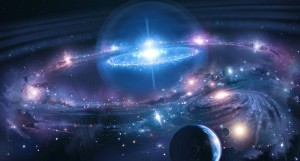Shiva, like some other Hindu deities, is said to have several incarnations, known as Avatars. Although Puranic scriptures contain occasional references to "ansh" avatars of Shiva, the idea is not universally accepted in Saivism.[171] The Linga Purana speaks of twenty-eight forms of Shiva which are sometimes seen as avatars.[172] In the Shiva Purana there is a distinctly Saivite version of a traditional avatar myth:
Virabhadra who was born when Shiva grabbed a lock of his matted hair and dashed it to the ground. Virabhadra then destroyed Daksha's yajna (fire sacrifice) and severed his head as per Shiva's instructions.[173]
Bhairava, Bhairava (Sanskrit: भैरव, "Terrible" or "Frightful",[1]), sometimes known as Bhairo or Bhairon or Bhairadya or Bheruji (In Rajasthan), is the fierce manifestation of Shiva associated with annihilation.[2] He is one of the most important deities of Rajasthan and Nepal, sacred to Hindus and Buddhists alike. When depicted as Kala Bhairava, Bhairava is shown carrying the decapitated head of Brahma.
Sharabha, Shaiva scriptures narrate that god Shiva assumed the Avatar (incarnation) of Sharabha to tame Narasimha - the fierce man-lion avatar of Vishnu worshipped by Vaishnava sect - into a normal pleasant form representing harmony. This form is popularly known as Sarabeshwara ("Lord Sarabha") or Sharabeshwaramurti. In Buddhism, Sharabha appears in Jataka Tales as a previous birth of the Buddha.
Durvasa (दुर्वास in Devanagari or durvāsa in IAST, pronounced [d̪urʋɑːsɐ] in classical Sanskrit), or Durvasas, was an ancient sage, the son of Atri and Anasuya. He is supposed to be an incarnation of Shiva.[174][175][176][177][178] He is known for his short temper. Hence, wherever he went, he was received with great reverence from humans and Devas alike.[174]
Khandoba, a form of Shiva, mainly in the Deccan plateau of India, especially in the states of Maharashtra and Karnataka. He is the most popular family deity in Maharashtra.
Adi Shankara, the 8th-century philosopher of non-dualist Vedanta "Advaita Vedanta", was named "Shankara" after Lord Shiva and is considered by some to have been an incarnation of Shiva.[179]
In the Hanuman Chalisa, Hanuman is identified as the eleventh avatar of Shiva and this belief is universal. Mahabhagvata Purana, Skanda Purana. However, Hanuman knows as “Rudraavtaar” “Rudra” is name of “Shiva”[180] people believe that Hanuman is the incarnation of Shiva. The vanar(ancestors of humans)-god Hanuman who helped Rama – the Vishnu avatar is considered by some to be the eleventh avatar of Rudra (Shiva).[181][182]
In Dasam Granth, Guru Gobind Singh have mentioned two avtars of Rudra: Dattatreya Avtar and Parasnath Avtar.[183]
Harihara is the name of a combined deity form of both Vishnu (Hari) and Shiva (Hara) from the Hindu tradition. Also known as Shankaranarayana ("Shankara" is Shiva, and "Narayana" is Vishnu), Harihara is thus worshipped by both Vaishnavites and Shaivities as a form of the Supreme God, as well as being a figure of worship for other Hindu traditions in general. Harihara is also sometimes used as a philosophical term to denote the unity of Vishnu and Shiva as different aspects of the same Supreme God. The exact nature of both Vishnu and Shiva (from their associated stories in Vedic and Puranic scriptures), and their position of difference or unity (or both), is a subject of some debate amongst the different philosophical schools.
Virabhadra who was born when Shiva grabbed a lock of his matted hair and dashed it to the ground. Virabhadra then destroyed Daksha's yajna (fire sacrifice) and severed his head as per Shiva's instructions.[173]
Bhairava, Bhairava (Sanskrit: भैरव, "Terrible" or "Frightful",[1]), sometimes known as Bhairo or Bhairon or Bhairadya or Bheruji (In Rajasthan), is the fierce manifestation of Shiva associated with annihilation.[2] He is one of the most important deities of Rajasthan and Nepal, sacred to Hindus and Buddhists alike. When depicted as Kala Bhairava, Bhairava is shown carrying the decapitated head of Brahma.
Sharabha, Shaiva scriptures narrate that god Shiva assumed the Avatar (incarnation) of Sharabha to tame Narasimha - the fierce man-lion avatar of Vishnu worshipped by Vaishnava sect - into a normal pleasant form representing harmony. This form is popularly known as Sarabeshwara ("Lord Sarabha") or Sharabeshwaramurti. In Buddhism, Sharabha appears in Jataka Tales as a previous birth of the Buddha.
Durvasa (दुर्वास in Devanagari or durvāsa in IAST, pronounced [d̪urʋɑːsɐ] in classical Sanskrit), or Durvasas, was an ancient sage, the son of Atri and Anasuya. He is supposed to be an incarnation of Shiva.[174][175][176][177][178] He is known for his short temper. Hence, wherever he went, he was received with great reverence from humans and Devas alike.[174]
Khandoba, a form of Shiva, mainly in the Deccan plateau of India, especially in the states of Maharashtra and Karnataka. He is the most popular family deity in Maharashtra.
Adi Shankara, the 8th-century philosopher of non-dualist Vedanta "Advaita Vedanta", was named "Shankara" after Lord Shiva and is considered by some to have been an incarnation of Shiva.[179]
In the Hanuman Chalisa, Hanuman is identified as the eleventh avatar of Shiva and this belief is universal. Mahabhagvata Purana, Skanda Purana. However, Hanuman knows as “Rudraavtaar” “Rudra” is name of “Shiva”[180] people believe that Hanuman is the incarnation of Shiva. The vanar(ancestors of humans)-god Hanuman who helped Rama – the Vishnu avatar is considered by some to be the eleventh avatar of Rudra (Shiva).[181][182]
In Dasam Granth, Guru Gobind Singh have mentioned two avtars of Rudra: Dattatreya Avtar and Parasnath Avtar.[183]
Harihara is the name of a combined deity form of both Vishnu (Hari) and Shiva (Hara) from the Hindu tradition. Also known as Shankaranarayana ("Shankara" is Shiva, and "Narayana" is Vishnu), Harihara is thus worshipped by both Vaishnavites and Shaivities as a form of the Supreme God, as well as being a figure of worship for other Hindu traditions in general. Harihara is also sometimes used as a philosophical term to denote the unity of Vishnu and Shiva as different aspects of the same Supreme God. The exact nature of both Vishnu and Shiva (from their associated stories in Vedic and Puranic scriptures), and their position of difference or unity (or both), is a subject of some debate amongst the different philosophical schools.


